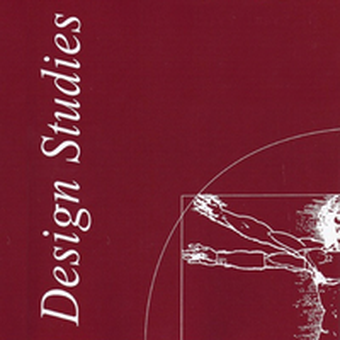Register
Event Details
Research Notes: An Ongoing Collection
Design Studies is introducing Research Notes, which will be short communications focusing specifically on research dealing with quality related issues in studies of designing, including research methods, literature review, theory development, design methodology, ethics, and research scholarship more generally. An initial Virtual Special Issue (VSI) will bring together a set of Research Notes that will form the foundation for an ongoing collection in Design Studies. Thus, we are searching for contributions that will set the tone and future direction for discourse on these topics.
The papers responding to this call will comprise a new submission format in Design Studies: Research Notes.
The Research Notes collection will be guest edited by:
Philip Cash pcas@dtu.dk
Laura Hay laura.hay@strath.ac.uk
Jordan Beck beckj@msoe.edu
Jaap Daalhuizen jaada@dtu.dk
Background
Designing is a complex, multifaceted phenomenon including human, artefactual, process, economic, social, and environmental dimensions (amongst others). Design research has traditionally employed a broad range of methods and theories, some taken from other fields and others uniquely developed for studying design. It also produces a variety of outcomes, including research papers, design tools, design methods, and designed artefacts. We are therefore a diverse community that produces rich research insights from multiple perspectives.
In order for the field to further mature it is necessary to reflect on, and build, research quality. For example, addressing challenges of methodological diversity and development, knowledge construction, and research relevance. This VSI and ongoing collection seeks to bring together key discussions on these topics in design research.
It can be difficult to appreciate the differences in worldviews and perspectives arising from different methodological and theoretical orientations of design researchers. It can also be challenging to keep track of the evolution in approaches that naturally occurs within the scope of Design Studies and related journals. Hence, the Research Notes in this VSI and the ongoing collection will create:
- a common forum for the discussion of research issues in studies of designing;
- an evolving reference source for best practices in research methodology, theory development, and scholarship; and
- a platform for developing the quality, relevance, and impact of design research.
Submission and Development
Interested authors should send a one page proposal to: Philip Cash pcas@dtu.dk by 1st September
Following the proposal stage the VSI editorial team will coordinate topics. Due to the new format and need to establish a solid foundation for the ongoing collection all authors will be invited to work with the editorial team in developing their papers. Further, we will organise a workshop in November where all authors will have the opportunity to develop contributions, identify connections between submissions, align style and approach, and generally discuss best practices for the ongoing collection. This will also form a basis for identifying future issues and challenges that will shape the ongoing collection, and will be used to develop an positioning editorial. Workshop participation will be online and voluntary.
It is anticipated that Research Note papers, following appropriate peer-review, will be published in Design Studies from: April 2021 and onward.
Key Dates
Extended 1 page abstract proposals: 1st September 2020
Workshop: November 2020
Papers for submission: April 2021 and onward
Potential Topics
In this call we are seeking diverse contributions dealing with quality-related issues in studies of designing. This includes aspects related to quantitative, qualitative, constructivist, research through design, and other approaches represented within the pages of Design Studies and related journals. Potential topics include, but are not limited to:
- Scientific models and knowledge construction
- Methodological pluralism
- Research method development
- Theory and method adoption from other fields
- Sampling (incl. use of students and practitioners)
- Emerging methods (incl. amendments to classical approaches)
- Best practices (incl. meta-analyses or other systematic analyses of quality)
- Studies of design methods (incl. method development and validation)
- Scholarly communication (incl. citation practices, research impact, and relevance)
The ‘Research Notes’ Approach and Format
Contributors are free to approach these or other relevant topics in any way appropriate, including evidence-based analyses, synthesis of best practices, systematic or other reviews etc.
In order to ensure the development of a constructive dialogue, all Research Notes should follow these basic guidelines:
- Be written with the aim of supporting researchers in developing better quality research, authors in better reporting on that work, and reviewers in interpreting the work and providing better feedback.
- Synthesize fragmented discussion in the literature where relevant.
- Be grounded in and respond to issues in Design Studies and related journals.
- Be within the scope of studies of designing i.e. excluding generic content or content already addressed in other fields, such as user evaluation of artefacts, studies of education, or modelling of technical systems.
- Be informed by an understanding of appropriate best practices in the topic area.
- Provide a positive and constructive contribution, with the aim to enable and motivate forward development of the field.
- Provide concrete, actionable guidance to readers when appropriate (a suggested structure could be: characterise issue, develop insights, operationalise concrete guidance).
- Be cognizant of the emerging Research Notes discussion as well as ‘regular’ research articles.
Papers should follow the Design Studies guidelines for Research Notes, comprising 2000 – 6000 words incl. references, with Highlights.
Example Research Notes from other fields include: Gibbert, Ruigrok, & Wicki, (2008); Wacker (2008); Gottfriedson et al. (2015).
References
Gibbert, M., Ruigrok, W., & Wicki, B. (2008). What passes as a rigorous case study? Strategic Management Journal, 29(13), 1465–1474.
Wacker, J. G. (2008). A conceptual understanding of requirements for theory-building research: Guidelines for scientific theory building. Journal of Supply Chain Management, 44(3), 5–15.
Gottfredson, D. C., Cook, T. D., Gardner, F. E., Gorman-Smith, D., Howe, G. W., Sandler, I. N., & Zafft, K. M. (2015). Standards of evidence for efficacy, effectiveness, and scale-up research in prevention science: Next generation. Prevention science, 16(7), 893-926.


